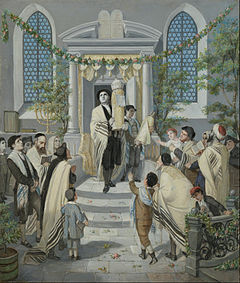
Back Sjavuot Afrikaans Schawuot ALS عيد الأسابيع Arabic عيد الاسابيع ARZ Шавуот Byelorussian Шавуот Bulgarian Chavouot Breton Xavuot Catalan Shavu’ot CEB Šavu'ot Czech
| Shavuоt | |
|---|---|
 Shavuot by Moritz Daniel Oppenheim | |
| Official name | Hebrew: שבועות or חג השבועות (Ḥag HaShavuot or Shavuos) |
| Observed by | Jews and Samaritans |
| Type | Jewish and Samaritan |
| Significance | One of the Three Pilgrimage Festivals. Celebrates the revelation of the Five Books of the Torah by God to Moses and to the Israelites at Mount Sinai, 49 days (seven weeks) after the Exodus from ancient Egypt. Commemorates the wheat harvesting in the Land of Israel. Culmination of the 49 days of the Counting of the Omer. |
| Celebrations | Festive meals. All-night Torah study. Recital of Akdamut liturgical poem in Ashkenazic synagogues. Reading of the Book of Ruth. Eating of dairy products. Decoration of homes and synagogues with greenery (Orach Chayim, 494). |
| Begins | 6th day of Sivan (or the Sunday following the 6th day of Sivan in Karaite Judaism) |
| Ends | 7th (in Israel: 6th) day of Sivan |
| Date | 6 Sivan |
| 2024 date | Sunset, 11 June – nightfall, 13 June |
| 2025 date | Sunset, 1 June – nightfall, 3 June |
| 2026 date | Sunset, 21 May – nightfall, 23 May |
| 2027 date | Sunset, 10 June – nightfall, 12 June |
| Related to | Passover, which precedes Shavuot |

| Part of a series on |
| Jews and Judaism |
|---|
Shavuot (ⓘ, from Hebrew: שָׁבוּעוֹת, romanized: Šāvūʿōṯ, lit. 'Weeks'), or Shvues (ⓘ, in some Ashkenazi usage), is a Jewish holiday, one of the biblically ordained Three Pilgrimage Festivals. It occurs on the sixth day of the Hebrew month of Sivan; in the 21st century, it may fall anywhere between May 15 and June 14 on the Gregorian calendar.[1]
Shavuot marked the wheat harvest in the Land of Israel in the Hebrew Bible according to Exodus 34:22. In addition, rabbinic tradition teaches that the date also marks the revelation of the Ten Commandments to Moses and the Israelites at Mount Sinai, which, according to the tradition of Orthodox Judaism, occurred at this date in 1312 BCE.[2]
The word Shavuot means "weeks" in Hebrew, and marks the conclusion of the Counting of the Omer. Its date is directly linked to that of Passover; the Torah mandates the seven-week Counting of the Omer, beginning on the second day of Passover, to be immediately followed by Shavuot. This counting of days and weeks is understood to express anticipation and desire for the giving of the Torah. On Passover, the people of Israel were freed from their enslavement to Pharaoh; on Shavuot, they were given the Torah and became a nation committed to serving God.[3]
While Shavuot is sometimes referred to as Pentecost (in Koinē Greek: Πεντηκοστή, romanized: Pentecostē, lit. 'Fiftieth') due to its timing fifty days after the first day of Passover, it is not the same celebration as the Christian Pentecost or Whitsun, which comes fifty days after Easter.[4][Note 1][5] That said, the two festivals are related, as the first Day of Pentecost, related in the Acts of the Apostles, is said to have happened on Shavuot.
Shavuot is traditionally celebrated in Israel for one day, where it is a public holiday, and for two days in the diaspora.[6][7][8]
- ^ "Shavuot - Jewish Tradition". yahadut.org. Retrieved April 1, 2024.
- ^ Spiro, Ken (May 9, 2009). "History Crash Course 36: Timeline: From Abraham to Destruction of the Temple". Aish. Retrieved August 19, 2010.
- ^ "What Is Shavuot (Shavuos)? – And How Is Shavuot Celebrated?". www.chabad.org.
- ^ "Is Shavuot the Jewish Pentecost?". My Jewish Learning. Retrieved April 22, 2021.
- ^ Neusner, Jacob (1991). An Introduction to Judaism: A Textbook and Reader. Westminster John Knox Press. p. 58. ISBN 978-0-664-25348-6.
The Feast of Weeks, Shavuot, or Pentecost, comes seven weeks after Passover. In the ancient Palestinian agricultural calendar, Shavuot marked the end of the grain harvest and was called the 'Feast of Harvest'
- ^ Goldberg, J.J. (May 12, 2010). "Shavuot: The Zeppo Marx of Jewish Holidays". The Forward. Retrieved May 24, 2011.
- ^ Berel Wein (May 21, 2010). "Shavuot Thoughts". The Jerusalem Post.
Here in Israel all Israelis are aware of Shavuot, even those who only honor it in its breach ... In the diaspora, Shavuot is simply ignored by many Jews ...
- ^ Jonathan Rosenblum (May 31, 2006). "Celebrating Shavuos Alone". Mishpacha. Retrieved June 4, 2020.
Yet most Jews have barely heard of Shavuos, the celebration of Matan Torah. In Eretz Yisrael, the contrast between Shavuos and the other yomim tovim could not be more stark. Shavuos is only about the acceptance of Torah. For those Israeli Jews for whom Torah has long since ceased to be relevant, the holiday offers nothing.
Cite error: There are <ref group=Note> tags on this page, but the references will not show without a {{reflist|group=Note}} template (see the help page).